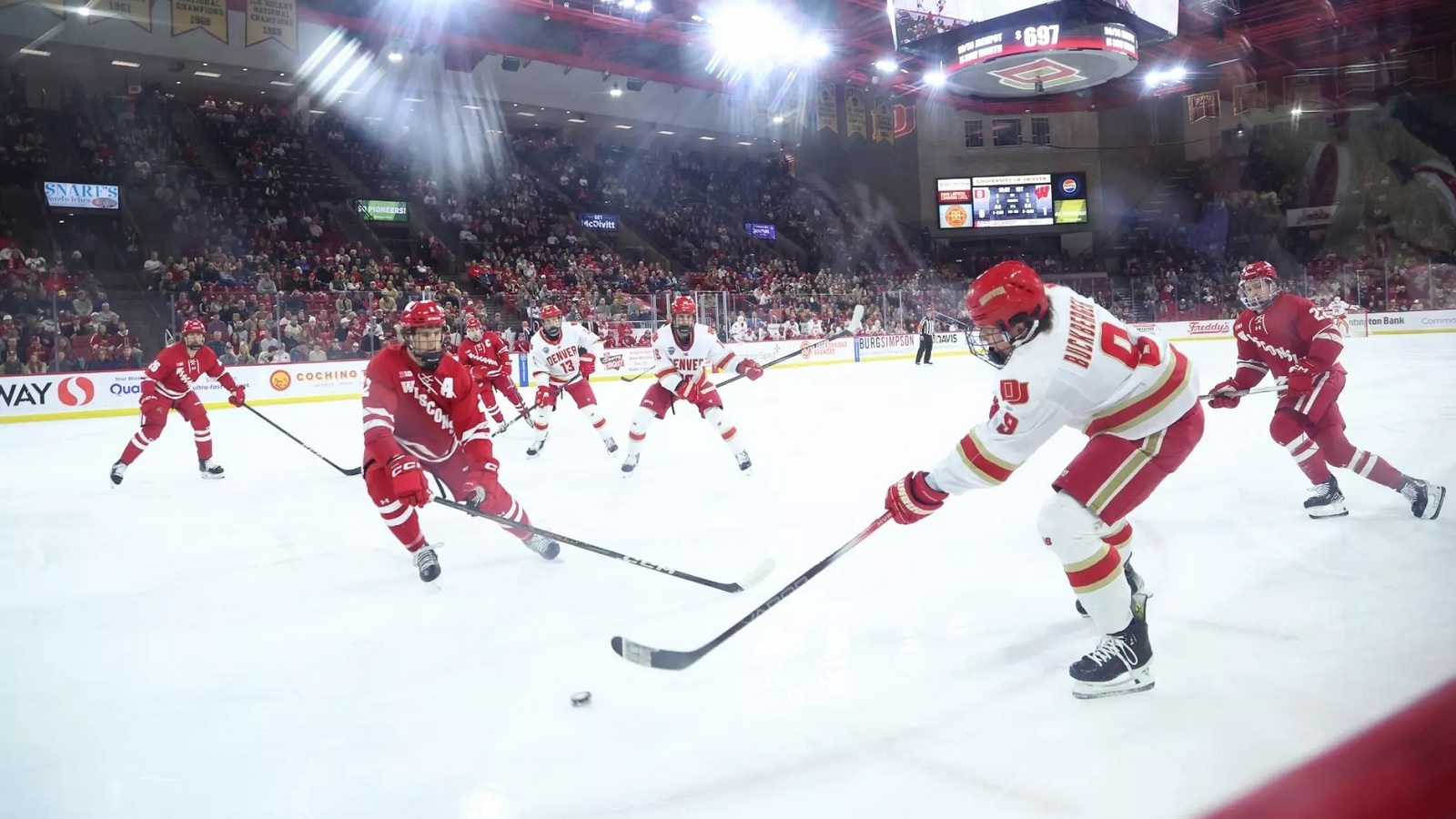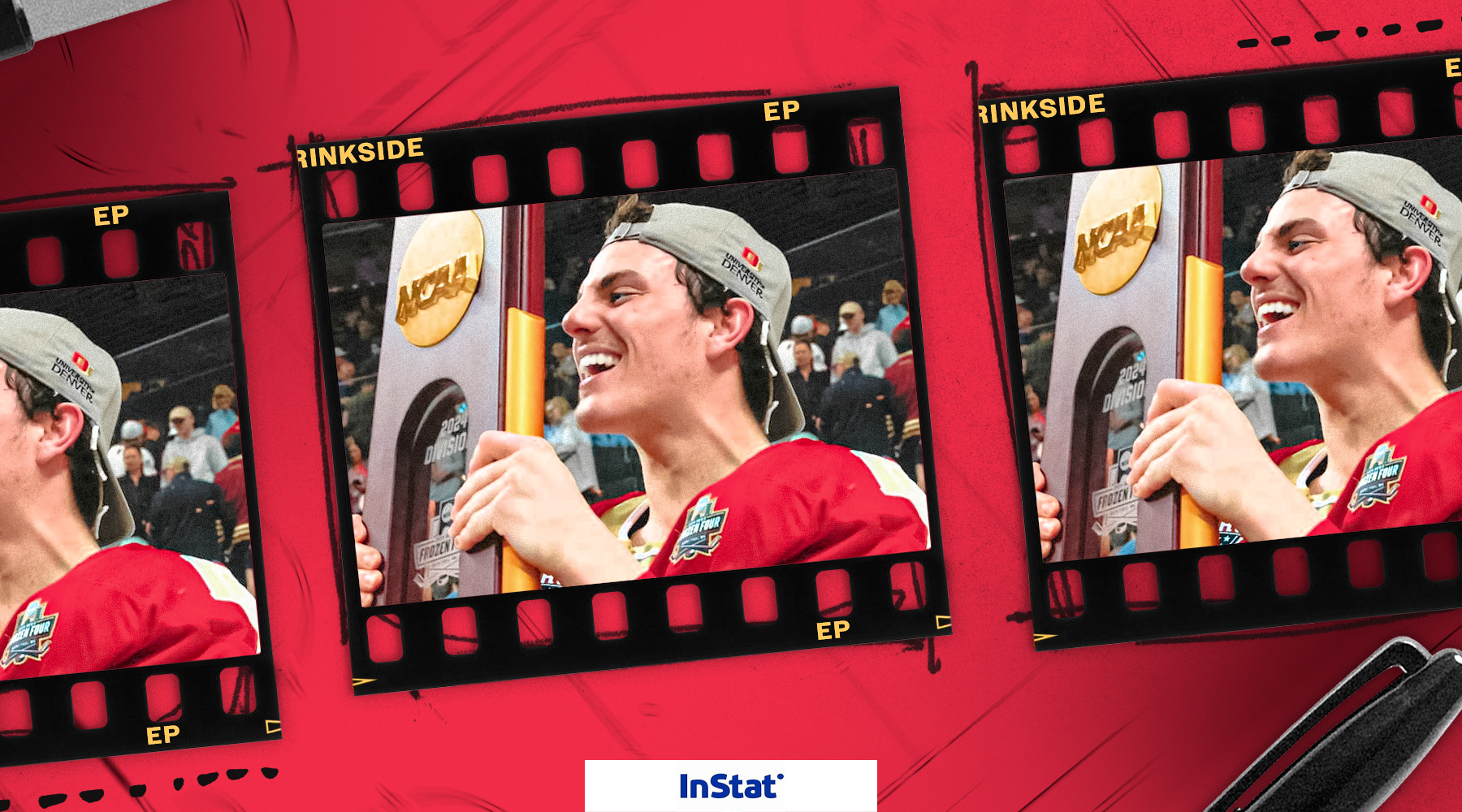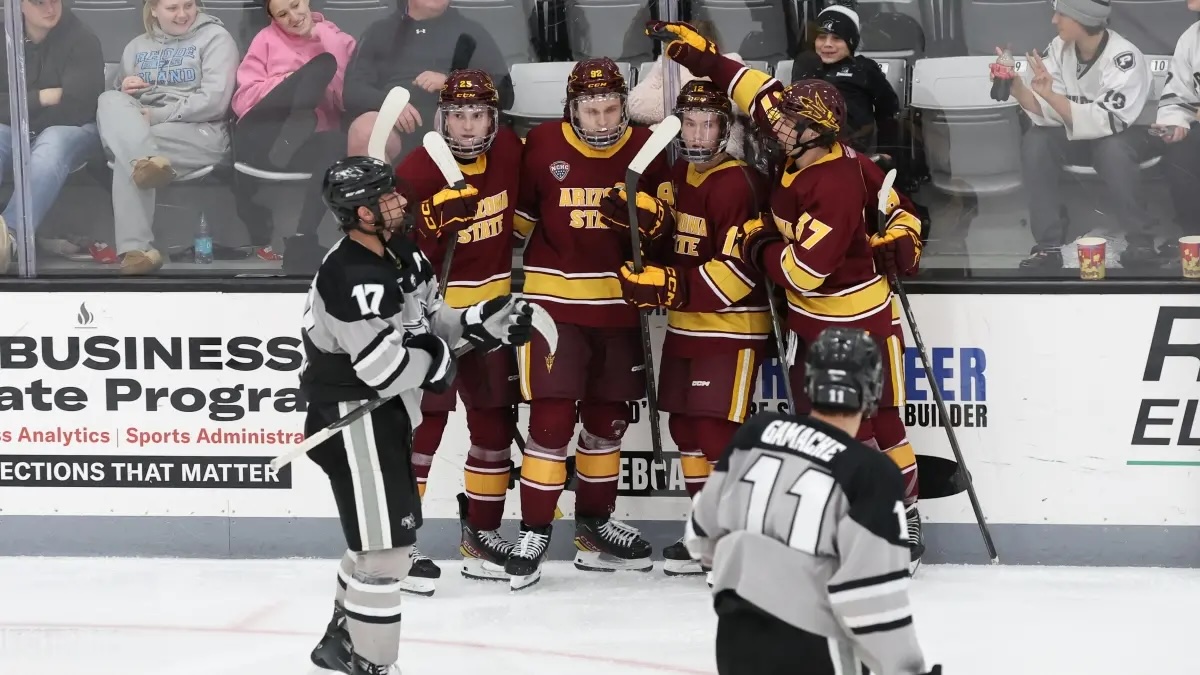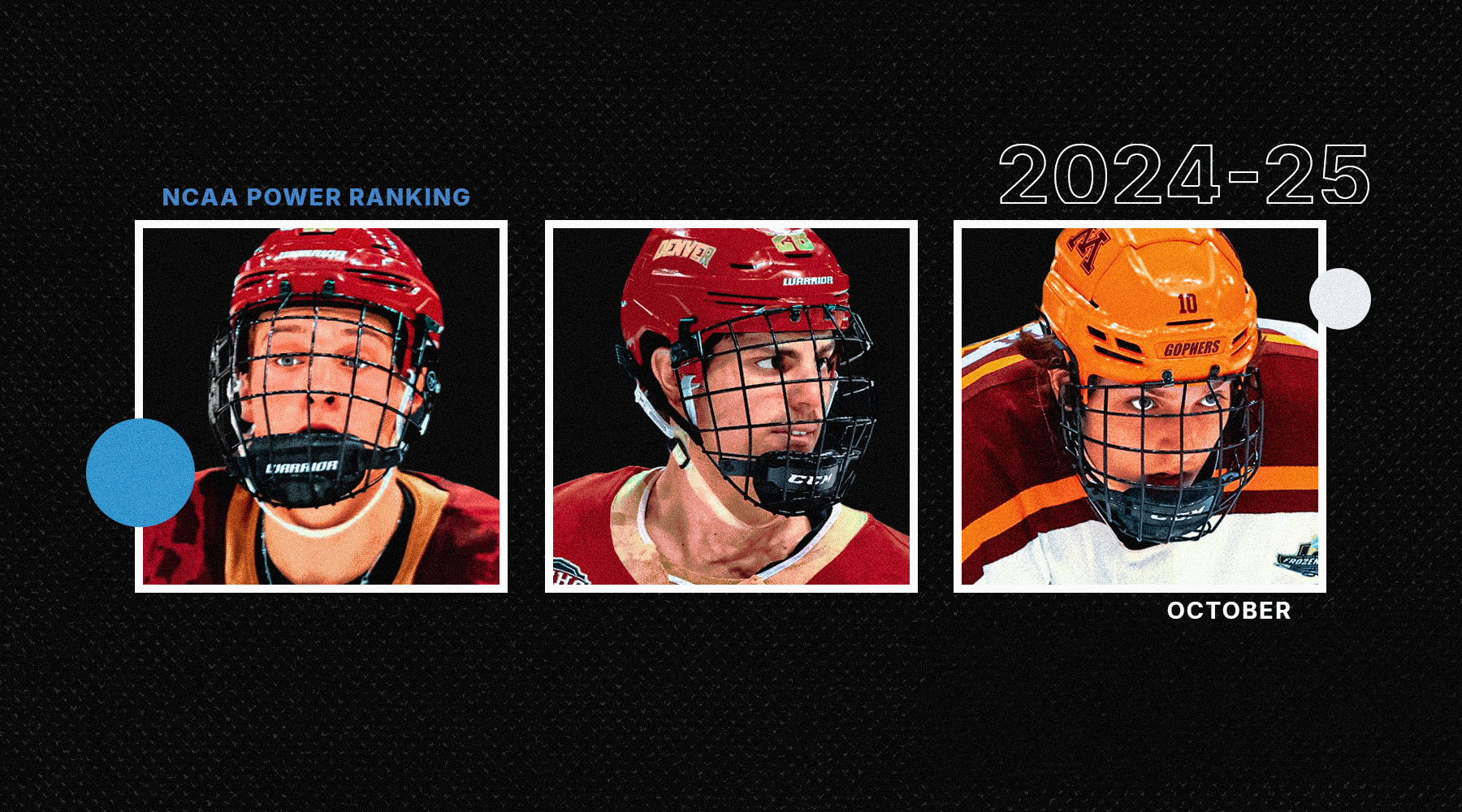NCAA Hockey: What makes Denver tick?

This article is presented by Everything College Hockey.
NEW HAVEN, Conn. — It's interesting to think about how the Denver Pioneers are so good, year after year.
They don't recruit many first-round picks. They tend to lose at least a few players to NHL contracts every offseason. They're usually on the young side in a developmental league where it's not uncommon to see 25- and 26-year-olds on rosters. Over time, you would think it would catch up to them, but it never does.
Leads you to wonder why. And this season, so far, has been an object lesson in the kind of program they've built over the past decade or so, during which they've gone to five Frozen Fours and won three national titles.
So, to start, they won their most recent championship — and NCAA Div. 1-record 10th — in April, beating Boston University and Boston College in the Frozen Four. It was their second title in three years. And over the summer, the Pioneers lost a number of the top contributors who led them to that peak. Massimo Rizzo. Tristan Broz. Sean Behrens. Shai Buium. Miko Matikka – all gone, having signed NHL contracts.
That's a lot of turnover, but if you're Denver, the reputation earns you a lot of respect. They were the preseason No. 1 team in the country, but questions lingered.
Still, turning over a good chunk of your top six up front and your blue line isn't ideal. Even the biggest skeptic would have to pencil the Pioneers in as "one of the best teams in the country by the end of the season," just because that's what they do. But growing pains? Those at least felt possible. Especially because, for the second year in a row, this is the second-youngest team in the country by average age.
When most teams lose great players like that up front and on the blue line, guys who would be the No. 1 centre or top defenceman on most teams, it requires an adjustment period. Not at Denver. Because there are only a few freshmen in the lineup every night, and all the returning players (minus the transfers) won a national title about seven months ago, it feels a lot different.
"I think the maturity and the starting point of our group is probably higher than it was a year ago," seventh-year Denver coach David Carle told Elite Prospects. "Doesn't mean there's not room for growth, but we're proud of the start and that's all it is, a start at this point. We gotta make sure that we're continuing to get better."
It is, however, hard to find too many areas where "better" is even conceivable. The No. 1 team in the country hasn't just hit the ground running: They're already moving at the kind of pace you might expect for a bullet train. Through the first month of the season, they're 8-0-0 with a 41-11 goal advantage and a plus-81 edge in shots. They're getting .941 goaltending. The power play is running at 32.5 percent. The penalty kill is at 92 percent. They're winning 56 percent of their faceoffs.
Denver has trailed for just 18:04. They have only been tied for 107:29. That means they've led their opponents for just about 353 minutes out of the 480 they've played. In fact, they've led by five goals or more for about 30 minutes — almost double the amount of time they've trailed by any amount. And, to be clear, they've never trailed by more than one goal, only on four different occasions, and never for longer than 7:08. It's outrageous.
That's across a long road trip to Alaska-Anchorage, a four-game homestand against teams with NCAA tournament aspirations like Northeastern and Wisconsin, and then another road trip out to Yale. Not that they're exactly grinding out wins here — their closest result to date was a 4-2 win over Wisconsin in which they trailed 1-0 and 2-1 (a grand total of 10:06 playing from behind, all in the first period) before pulling away in the third, but the leadership coming back at the top of the lineup has them playing with a swagger and determination that's made them near-invincible to start the season.
"There seems to be less unknowns coming into it this year than there maybe was a year ago with 11 freshmen," Carle said. "And [being] the second-youngest team in the country, it's funny that there's five freshmen and we're still the second-youngest, but we do feel a little bit older and more mature, for sure."
Their style is suffocating and dispiriting. They have not yet ended a period down a goal, never trailed outside the opening few minutes of a game. In fact, the opening period has been their worst; they "only" have a 12-5 advantage in goals; it's 18-2 in the second and 11-4 in the third.
It helps to have dominant players at all three positions, led by a pair of Hobey hopefuls in the outfield, and a guy who so far looks like the Mike Richter Award favourite. The biggest name on the list, as far as draft position goes, is Minnesota first-round choice Zeev Buium (the only first-round pick on a Denver roster since the 2017-18 draft). He was the second-youngest player in college hockey last season and won't turn 19 until December. The sophomore defenseman is playing about 24 minutes a night, and just devouring the competition. He's first over the boards in every situation, and when he's on the ice, Denver is outscoring the competition 20-5. He hasn't scored a goal yet, after netting 11 last season, but he has 10 assists through eight games, and the No. 12 pick is continually working to find ways to maximize his effectiveness.
"I think the challenge for him is everybody knows who he is. He's a known commodity," Carle said. "People are gonna be hard on him. They have a full year of tape on what he does and how he does it, and so for him, I think we've seen the physical maturity. I think we've seen growth in the mental side as well. He wants to impact the game at both ends of the rink, and obviously he's a very dynamic player."
Another essential blue liner, who holds down the second pair and gets a bunch of power play minutes, is transfer Eric Pohlkamp, who starred for Bemidji State last year and entered the portal over the summer. Denver won that recruiting battle with North Dakota — perhaps in part because Carle coached the defender at World Juniors last year — and has reaped immediate benefits. He plays about 21 minutes a night. Denver is outscoring opponents 14-3 when he's out there, and he's already got four goals and five assists. Pohlkamp is one of seven Denver players running at a point a game or better, and the fact that he and Buium are out there for two-thirds of the game is hell for other teams.
"He's been a great addition, a great kid," Carle said. "Teammates really, really have taken a liking to him early on and obviously, you see what he can do on the ice. He does it at both ends of the ring, he's physical, blocking shots with his face, and scores goals."
Like Buium, another top returnee trying to build out his game because an NHL debut seems to be in the cards this spring is senior right wing Jack Devine. He, too, was the second-youngest player in the NCAAs as a freshman, but took a huge step forward as a producer last season, scoring 56 points in 44 games and finishing in the Hobey Baker top 10.
But he did it alongside Rizzo for a good chunk of the year before that partnership was dissolved by an injury that held Rizzo, now in the Flyers organization, out of the lineup from early February until the Frozen Four. Devine continued to produce at a high rate even without Rizzo, and there was some concern that he might sign with the Florida Panthers, who drafted him 221st overall in 2022, in the summer.
Now playing next to Aidan Thompson and Carter King, it's so far, so good: He has at least one point in every game and leads the country with a 1-15—16 line. You'd maybe like to see him score goals as frequently as last year, when he was fourth in the country, but you can't argue with two assists a game, either. He's not shooting as much, but he also won't shoot under five percent all year.
"He just turned 21," Carle said. "Really young player. It wasn't gonna do him any harm, coming back and trying to make sure his body was as ready as possible. You've seen a lot of the top players who are 18, 19 year olds in the [NHL] get injured. It's a hard league. It's not a developmental league… We're trying to make sure that we're holding him accountable so that he's getting everything out of the year that he can, so that he has the best chance to make Florida's roster next year."
The third returning big-time impact player is goaltender Matt Davis, the MVP of the Frozen Four. Unlike Buium and Devine, he came to Denver at 20, putting him on the older side of freshmen in the country at the time. He, too, could have signed an NHL deal, but returned for one last kick at the can in college. And so far, his team is undefeated, he's conceded just 10 goals in seven appearances, and he has a .939 save percentage. It doesn't get much better than that, and it's a continuation of what he did in the second half of last season after coming back from an injury that held him out of the lineup from late October to early January. If anything, he's improved.
"I think that's physical development," Carle said. "He's getting to his spots cleaner, crisper on his feet, more control. A lot of that's his leg and core strength to be able to do it. And his mental fortitude — he's gotten scored on at times. I think about the Wisconsin game, gets scored on, how's he gonna respond? Or the Northeastern game, gets scored on, how's he gonna respond? And he's come back and made a couple of big saves after getting scored on, which to me is again, that's a sign of his mental growth."
So really, this is Denver getting a lot out of known quantities, and somehow getting a little more each season. This is Denver identifying contributors as either transfers or junior players, and onboarding them quickly. And that's how you make up for losing five players to NHL deals in the space of a few weeks.
In fact, one of the few roster spots designated for a freshman is actually a rather important one: Jake Fisher, selected in the fourth round by Colorado at this past draft, is the second-line center, and he's producing at nearly a point-per-game pace between Rieger Lorenz and fellow rookie James Reeder. They've combined for seven goals through eight games, and show a kind of pack mentality around the net that stands out almost every time they're on the ice. Typical Denver hockey, really.
"The USHL is a great league, I think it's prepared him well. You really good coach there in [ex-Pioneer defenceman] Brett Skinner," Carle said. "Won a championship in Fargo, but I think was, you know, he taught the game the right way, held accountable. So I've been impressed with his secondary game and some of his habits and details, as a freshman. His shot, his size. Those are things certainly stand out, but I've been more impressed by the secondary game that he has."
Normally a No. 1 team in the country playing a lower-ranked opponent (the Bulldogs were picked 10th of 12 in the ECAC coaches poll) would maybe try for a lot of fancy plays, stretch passes, odd-man rushes. Not Denver. That "secondary game" Carle likes to see in Fisher is the thing all Denver players seem to have in spades. They want to play like grinders, for lack of a better term. On Friday night against Yale, they approached the game as though this was the most important night of their season, and took nothing for granted. They were in hard on every forecheck from puck drop, generating numerous chances around the goalmouth, keeping plays alive for extended shifts in the offensive zone, and generally hemming Yale in for long stretches — shot attempts in the game were 59-39 at even strength, and the scoring chances were off the charts in Denver's favour until Yale got some late power plays, and still ended 28-20.
In fact, those late power plays were where the crowd in the arena and watching at home got a real look at what defines the Pioneers as an elite team: They were up 5-0, killing a penalty with under four minutes left in an already done-and-dusted game in October against a seriously inferior non-conference opponent they had beat 14-0 on aggregate last season playing like it was a one-goal lead in the national title game. During that PK, they allowed 10 shot attempts (not ideal). Davis stopped four himself, and the players in front of him blocked three more, including Pohlkamp making the aforementioned block with his face.
In all, the top PK unit was out there for 100 straight seconds without a break. When Davis finally froze the puck, those players went back to the bench with big smiles on their faces. Some were laughing. They just like playing like that; they're wildmen.
"They enjoy being in the battle and I don't necessarily think that necessarily comes from me or staff," Carle said. "I think a lot of that's internal to them, to play for each other."
That attitude has become part of the organizational culture, built up over years of success. It's not that Denver doesn't get elite players. They have plenty of them and will continue to attract them for many years to come. Instead, it's the fact that they recruit elite players who don't necessarily think like elite players, and have a dog-on-bone mentality in every situation. They simply do not take shifts off. If they're gonna block a shot with their face with a 5-0 lead in a game like this and come up laughing, when won't they have that mentality?
"I think it's what's separates us, truthfully, from the other blue bloods or top tier programs," Carle said. "We take a lot of pride in how we defend and I think we do it better than the other elite teams in the country that, you know, have the quote-unquote talent that everyone gets excited about here. Our guys hang their hat on that. They're proud of it."
Good luck to everyone else.
 2024-06-27, 20:452024 NHL DraftFilm Room: Zeev Buium is already an NHL-calibre defender with the potential for so much moreZeev Buium had the best first-time draft-eligible season in college hockey in recent memory.
2024-06-27, 20:452024 NHL DraftFilm Room: Zeev Buium is already an NHL-calibre defender with the potential for so much moreZeev Buium had the best first-time draft-eligible season in college hockey in recent memory. 2024-10-22, 23:34NCAAArizona State ready to adjust to conference lifeArizona State's NCHC journey begins this season, and it's a big jump from the independents.
2024-10-22, 23:34NCAAArizona State ready to adjust to conference lifeArizona State's NCHC journey begins this season, and it's a big jump from the independents.


